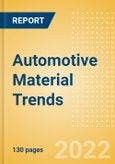For some time, the automotive industry has been under pressure to change the way it designs and builds vehicles, due to factors such as the increasing impact of passenger and pedestrian safety requirements and the competitive intensity caused by globalisation and manufacturing in low cost economies. Furthermore, governmental pressure in Europe and North America to reduce CO2 emissions has prompted vehicle makers and their supply base to develop automotive technology to meet those strict emission limits.
Consequently, more vehicles are incorporating components aimed at mass reduction, parts consolidation to reduce assembly costs and more efficient recycling. The vehicle makers’ need to improve overall fuel economy in vehicles has led to the trend toward minimising vehicle weight. The use of performance materials such as high-strength steel and aluminium is on the rise and heavier traditional materials, such as steel and iron, are being replaced whenever possible.
The report “Automotive Material Trends - Global Sector Overview and Forecast (Q1 2022 Update)” provides a comprehensive overview of the global body material trends sector, major suppliers, top 14 markets, technology trends and market size forecasts.
The study reviews and forecasts the main materials used in vehicle manufacture, namely Steel, Aluminium, Plastics, Iron and Glass apart from other materials such as Organic, Carbon Fibre and Magnesium.
*The top 14 markets accounting for over 98% of global light vehicle production include - North America (US, Canada and Mexico) ; Mercosur (Brazil and Argentina); Western Europe (Germany, Italy, France, UK, Spain, Portugal, Netherlands, Belgium, Sweden, Austria, Finland and Morocco) ; Central Europe (Turkey, Bulgaria, Czech Republic, Poland, Slovakia, Hungary, Romania, Serbia and Slovenia); Russia; Japan; China; India; Korea; Thailand; Other Asia; Iran; South Africa; Australia.
Based on exclusive interviews, primary research and proprietary data this global market study includes -
Consequently, more vehicles are incorporating components aimed at mass reduction, parts consolidation to reduce assembly costs and more efficient recycling. The vehicle makers’ need to improve overall fuel economy in vehicles has led to the trend toward minimising vehicle weight. The use of performance materials such as high-strength steel and aluminium is on the rise and heavier traditional materials, such as steel and iron, are being replaced whenever possible.
The report “Automotive Material Trends - Global Sector Overview and Forecast (Q1 2022 Update)” provides a comprehensive overview of the global body material trends sector, major suppliers, top 14 markets, technology trends and market size forecasts.
The study reviews and forecasts the main materials used in vehicle manufacture, namely Steel, Aluminium, Plastics, Iron and Glass apart from other materials such as Organic, Carbon Fibre and Magnesium.
*The top 14 markets accounting for over 98% of global light vehicle production include - North America (US, Canada and Mexico) ; Mercosur (Brazil and Argentina); Western Europe (Germany, Italy, France, UK, Spain, Portugal, Netherlands, Belgium, Sweden, Austria, Finland and Morocco) ; Central Europe (Turkey, Bulgaria, Czech Republic, Poland, Slovakia, Hungary, Romania, Serbia and Slovenia); Russia; Japan; China; India; Korea; Thailand; Other Asia; Iran; South Africa; Australia.
Scope
Based on exclusive interviews, primary research and proprietary data this global market study includes -
- Material use as a percentage of Vehicle Body Weight for the top 14* markets.
- A review of the latest material developments, applications and market trends (including Space Frames, Engine Cooling, Armour, Braking, Reinforcing, Seating, Light-Weighting, Films, Aluminium, Carbon Fibre, Coatings, Magnesium, Organic Materials, Plastics and Composites, Steel And Recycling initiatives).
- Exclusive interviews with OE suppliers including Isolite Group, Zircotec, Prodrive, JAPIA, Tata Steel, Surface Processing.
- Sector PESTER (Political, Economic, Social, Technological, Environmental and Regulatory) analysis.
- Updated profiles of the major materials suppliers including their strategies and prospects.
- Material use forecasts as a percentage of vehicle body weight for the top 14* markets (sectors include Steel, Iron, Aluminium, Plastics, Glass and Other Materials).
Reasons to Buy
- Gain a quick overview of the Automotive Materials sector globally.
- Understand the size and scope of the world's top 14 markets.
- Hear direct from leading companies on their strategies and plans.
- Review the latest and most significant technological developments.
- Follow the key trends within the sector and what's driving them.
- Spot opportunities and threats in this sector.
- Track key companies' latest activities and prospects.
- Prepare supply and demand forecasts.
- Produce internal sales plans and forecasts.
- Carry out competitive intelligence.
Table of Contents
1. PESTER Analysis
2. Companies
4. Materials
5. Archive
List of Tables
List of Figures
Companies Mentioned (Partial List)
A selection of companies mentioned in this report includes, but is not limited to:
- Stadco
- Gestamp Automocion
- Solvay
- Hyundai Motor Group
- Accuride Corporation
- 3M
- Robert Bosch GmbH
- Continental AG
- Alcoa, Inc
- BASF SE
- Bridgestone Corporation
- Cooper Tire & Rubber Co
- Visteon Corporation
- Benteler International AG
- CIE Automotive SA
- Cooper-Standard Automotive Inc
- Dow Automotive Systems
- Faurecia SA
- Draxlmaier Group
- DuPont
- Woodbridge Group
- Covestro
- Webasto AG
- Freudenberg & Co. KG
- Lear Corporation
- Trelleborg AB
- Toyota Boshoku Corporation
- Goodyear Tire & Rubber Company
- Toyoda Gosei Co., Ltd.
- Toyo Tire and Rubber Co, Ltd
- Honeywell International Inc.
- International Automotive Components Group (IAC)
- Inteva Products, LLC
- Johnson Controls International plc
- ThyssenKrupp AG
- Sumitomo Corporation
- Joyson Safety Systems
- Magna International Inc.
- Martinrea International Inc.
- Metaldyne, LLC
- Michelin
- Plastic Omnium
- PPG Industries
- Autoneum
- Saint-Gobain
- Samvardhana Motherson Group
- Nippon Sheet Glass
- ZF Friedrichshafen AG
- Kobe Steel, Ltd.
- Lanxess
- Evonik
- LG Chem, Ltd.
- Sogefi S.p.A.
- SABIC Innovative Plastics
- Henkel
- Arconic








